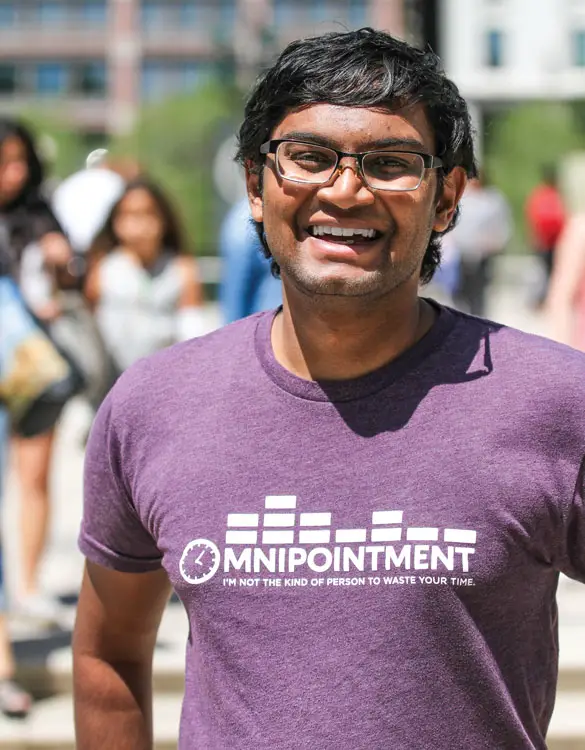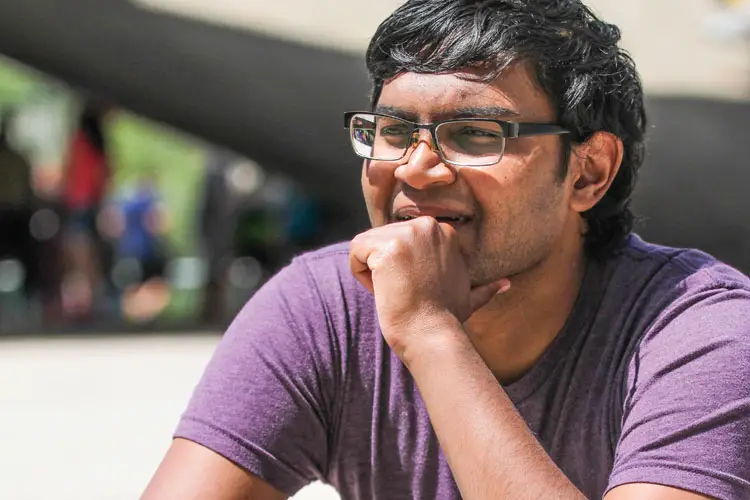Vinesh Kannan, a third-year student at the Illinois Institute of Technology, grew up in Schaumburg, Illinois, and it was in the tiny Midwest town that he first developed his love for computers. Kannan went on to study Computer Science in college, and while there, he, like almost every undergraduate, experienced the anarchy of one of the most reviled of all university traditions—the group project.
The junior found that many of the problems with collaborative work stem from poor communication, and while he realized that there was no app in the world that could motivate an uninvolved group member, Kannan went about creating software that would make organizing and communicating amongst teammates as simple as possible, thereby removing as many impediments to clear communication as possible. The result was Omnipointment, a start-up that Kannan created alongside another student in order to improve the group project experience.
Kelly Keglovits: When did you first develop your interest in computers?
Vinesh Kannan: When I was in high school, I got introduced to computer science and programming by classmates who loved learning about it on their own. I really liked the idea that you could just write text in a file to make a computer do cool things. And it didn’t seem like you needed to be a certain age or skill level or have a degree to do it; you could learn from your own experiments and mistakes.
KK: Can you describe your start-up, Omnipointment, and what your inspiration was for the project?
VK: Omnipointment is on a mission to save college students from crappy group projects! Many students have horror stories about finishing all their team’s work the night before a project is due or dealing with teammates who never seem to be free. We think it’s a shame, because working in teams can teach students a lot about their own skills and leadership abilities; instead, group projects seem to be teaching us to trust no one.
We create web-based tools to help students work better in teams. Students at seventy-five universities use our website to find times when their team is free to meet. It’s especially useful for students who are part of multiple group projects and student orgs, trying to manage everything on their plate. We also provide “collaboration reports” to help students exchange constructive feedback on how to do better quality work. The reports also loop in the professor, so they can help teams that might be having trouble before its too late as well as give more fair grades at the end of the semester.

KK: What was the creation process for Omnipointment?
VK: For more than sixteen months, we have been interviewing professors and students all over the country and from all kinds of colleges to learn about group projects. When we create new products, we test them with students and use their feedback to improve. Having professors and schools pay for our services has been a challenging journey, but we really enjoy working with our customers because they’re not afraid to experiment with new ways of teaching and learning.
KK: What type of help/support have you received?
VK: My partner in crime, Brendan Batliner, is our CTO. We are constantly reviewing our findings from interviews with students and professors to figure out how to make group projects a better experience for students. We are really blessed with mentors. Our entrepreneurship professor, Nik Rokop, is a real-world mentor: He teaches us about business by pushing us to do things and learn from our customers. Omnipointment is also supported by Future Founders, which runs a national fellowship of college-age founders who motivate and learn from each other.
KK: Has Omnipointment received any success or recognition?
VK: We’re not some crazy machine learning or emoji startup, but we have been invited to many great star-tup competitions. One highlight of this year included traveling to Austin for SXSW. We competed in the final round of Student Startup Madness, a March-Madness style tournament for college companies.
KK: What else are you involved in?
VK: I love to learn about civic technology every week at ChiHackNight. I am also working with a team to teach a class for incoming college freshmen; it’s all about computer science and infectious diseases.
KK: Do you have any big ideas to come?
VK: Well, we’re really invested in the Facebook memes space right now. We started a small group called Group Project Memes for Collaborative Teens and we really think it can shake up the…kidding! In all seriousness, we are working on a new tool to help students learn how to delegate responsibilities effectively. If a professor or class you know would be interested in trying it out, shoot us a note at team@omnipointment.com!
















